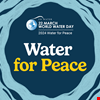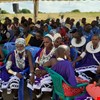
/ Southern Africa
Partners to Advance Sustainable Financing Solutions for shared Transboundary Resources in Southern Africa
2025: The Southern African Development Community (SADC) will convene representatives from its Member States, River Basin Organizations (RBOs), Transfrontier Conservation Areas (TFCAs), development partners, civil society, International Cooperating Partners (ICPs), and financial institutions for the inaugural Transboundary Water and Landscapes Sustainable Finance Bootcamp.

/ Southern Africa
Strengthening Synergies: Pan-African Dialogue Aligns Transboundary and National Water Investment Priorities
Water and climate stakeholders convened for the 2025 Pan-African Transboundary Dialogue and Training on National Water Investment Programming in Africa from 28th to 29th April 2025 in Addis Ababa, Ethiopia, in a bid to strengthen synergies between transboundary and national water investment priorities.

/ Southern Africa
Mozambique and Zimbabwe commit to tackling escalating challenges in the Buzi, Pungwe, and Save River Basins
The governments of Mozambique and Zimbabwe have pledged their commitment to tackling social, economic, and environmental challenges on the increase in the Buzi, Pungwe, and Save (BUPUSA) River Basins, shared exclusively by the two countries. The commitment was expressed through the signing of the Strategic Action Programme (SAP) for the BUPUSA Watercourses by ministers for water in the two countries, on 29 November 2024. The 10-year SAP was developed by the two governments with funding from the Global Environment Facility (GEF) and technical support from the Global Water Partnership Southern Africa and the International Union for Conservation of Nature.

/ Eastern Africa, Southern Africa
Upcoming event: Pan-Africa Water Governance and International Water Law (IWL) Training-9-12 December 2024
Join us for a transformative training designed to foster partnerships and build your expertise in transboundary water law. The 2024 Pan Africa Water Governance and International Water Law (IWL) Training which will be held on 9-12 December 2024 in Entebbe, Uganda in a hybrid format will help participants gain skills and knowledge needed to develop effective agreements and promote stronger cooperation over shared water resources across Africa.

/ Southern Africa
GWPSA @ the 25th WaterNet/WARFSA/GWPSA Symposium
The 25th WaterNet/WARFSA/GWPSA Symposium will be held from 30th October to 1st November 2024, at Avani Maseru Hotel, Maseru, the Mountain Kingdom of Lesotho. The event will be held under the theme, “Enhancing Sustainability: Upscaling Innovations and Best Practices for Integrated Catchment and Water Resources Management (ICWRM) in Eastern and Southern Africa – Leaving No One Behind”

/ Southern Africa
Flowing Towards Harmony: Using Transboundary Water Cooperation for Peace in Southern Africa
Growing populations and climatic impacts are placing unprecedented pressure on water resources. This is true of the Southern African Development Community (SADC) region which comprises 16 Member States, whose population in 2018, was estimated to be at 345.2 million, a rise from 336.9 million as of 2017. Rivers play a pivotal role in the region's socio-economic development, as evidenced by its reliance on these waterways. Southern Africa boasts of 15 major transboundary river basins, shared among neighbouring countries, with 13 basins entirely within the region's borders. However, the equitable distribution of water resources remains a challenge, exacerbated by climatic factors influencing rainfall patterns and the geographical distribution of river basins. While these rivers can spark conflicts, they also serve as conduits for peace and cooperation. Therefore, prioritizing transboundary water cooperation is not merely about economic prosperity but also essential for nurturing stability and harmony throughout the region.

/ Southern Africa
Remarkable progress recorded in flood and drought management in BUPUSA
The governments of Mozambique and Zimbabwe have recorded remarkable progress in building resilience against climate shocks, including floods and drought in the Buzi, Pungwe, and Save River Basins (BUPUSA), shared exclusively by the two countries.

/ Southern Africa
SADC promotes climate-resilient Integrated Water Resources Management in Tanzania
The Southern Africa Development Community (SADC), in collaboration with the Global Water Partnership Southern Africa (GWPSA), implemented a climate-resilient integrated water management pilot project in the Wami/Ruvu Basin, in Tanzania, that is aimed at helping communities living within the Basin adapt to the adverse effects of climate change.

/ Southern Africa
Mozambique and Zimbabwe Establish Tri-Basin Institution to Manage the Buzi, Pungwe, and Save Water Resources
The governments of Mozambique and Zimbabwe have established a tri-basin institution to manage the Buzi, Pungwe, and Save River Basins’ water resources, which have, over the years, suffered from extreme climate effects such as floods, droughts, and cyclones.

/ Southern Africa
Cooperation key to promoting sustainable water resources management in the Southern African Development Community region
Southern Africa is endowed with a complex network of river systems, which are formed extensively from shared watercourses. 15 of the river basins within the region are shared between one or more countries, 13 of which are shared fully within the Southern African Development Community (SADC) region. Cooperation is needed to promote sustainable management, development, and use of these shared water resources. This was one of the recommendations given during the special session on river basin organisations convened by SADC, OKACOM, and GWPSA on 20 October 2022 at the 23rd WaterNet/ WARFSA/ GWPSA Symposium.